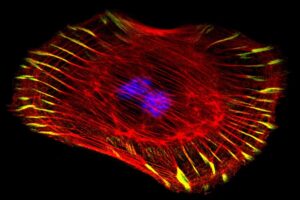Writing
THEOLOGY, SCIENCE & APOLOGETICS
Select a category from the drop down menu, or browse the latest articles below.

The Eukaryotic Cell Cycle: An Irreducibly Complex System
Various components of the mitotic cell division apparatus are indispensable for the system to work. This makes the eukaryotic cell division irreducibly complex, rendering it resistant to explanations in terms of blind, evolutionary processes.

New Paper Challenges Evolutionary Account of the Eukaryotic Cell Cycle
My new paper is out now in the journal BIO-Complexity, regarding the origins of the eukaryotic cell division cycle.

Challenges to the Evolutionary Origins of the Glycolytic Pathway
Multiple challenges confront an explanation of the glycolytic pathway in terms of unguided evolutionary mechanisms. The complexity and engineering sophistication comport much better with the hypothesis of design.

The Formation of Our Digits Points to a Process with Foresight
Have you ever wondered how our fingers and toes form during embryonic development? Our digits are, in fact, sculpted from a paddle-like structure in the embryo through the process of apoptosis — that is, programmed cell death. During early development, the hands and feet begin as solid, webbed structures. Through carefully controlled apoptosis, the tissue between them is eliminated, facilitating the separation of the digits.

Engineered Elegance: Generating the Wait Anaphase Signal
The spindle assembly checkpoint pathway is an elegantly engineered surveillance system for protecting the cell from the adverse consequences of improper kinetochore-microtubule attachment.

The Elegant Spindle Assembly Checkpoint
In a recent article, I discussed the astounding role of motor proteins in eukaryotic cell division. But this is just one of many incredible engineered features associated with mitosis. In this and a subsequent article, I will provide an overview of the elegant molecular mechanisms that underlie the spindle assembly checkpoint and discuss the implications of its dysfunction.

New Paper Argues that Variant Genetic Codes Are Best Explained by Common Design
A popular argument for a universal common ancestor is the near-universality of the conventional genetic code. Critics of common descent often point to deviations from the standard code as evidence against it. A recent paper published in the journal BIO-Complexity, by Winston Ewert, reviews the character and distribution of genetic code variants and the implications these have for common ancestry.

Have John Nelson and Josh Parikh Refuted the Reportage Model?
A couple of weeks ago, an episode aired on the skeptical Doubts Aloud podcast, featuring John Nelson and Josh Parikh, in which they offered a critical appraisal of the high-resolution reportage model of the gospels, advocated by myself, Tim and Lydia McGrew, Peter J. Williams, Wesley Huff, and other scholars.

Reflections on Casey Luskin’s Debate with “Dr. Dan”
Casey Luskin recently participated in a debate, on YouTube’s NonSequitur Show, with Daniel Stern Cardinale, an evolutionary biologist at Rutgers University who is also known as “Dr. Dan” of the YouTube channel Creation Myths.